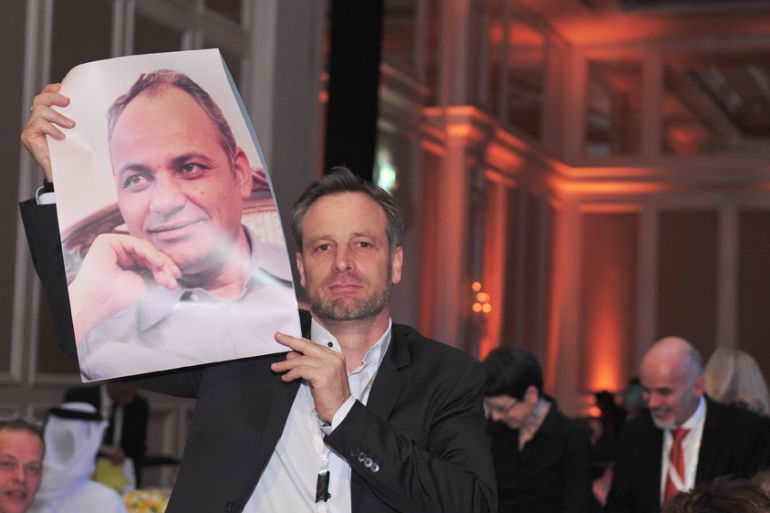Journalists raise call for media freedom at Doha event
Journalism at Risk, the theme of IPI’s 65th annual summit, raises questions about global safety and freedom violations.

Doha, Qatar – Hundreds of journalists from around the world gathered in Qatar to raise calls for their protection and the right to freedom of expression as conflict has gripped several countries in the Middle East and media professionals worldwide continue to report press freedom violations.
“Journalism at Risk”, the theme of the International Press Institute’s (IPI) 65th annual summit, launched in Qatar’s capital, Doha, on Saturday and was attended by around 300 leading international journalists.
Keep reading
list of 4 itemsGeorgia advances ‘foreign agents’ bill as 20,000 rally against it
NPR editor resigns after accusing US outlet of liberal bias
Lawmakers brawl as Georgian Parliament considers ‘foreign agent’ bill
Al Jazeera Media Network (AJMN) is the official host of the event, as well as the World Media Summit which begins on Sunday with a focus on journalist safety and the future of news.
The IPI event runs until Monday.
“I hope this conference finds answers to one of the most important issues that face media professionals and organisations, which is how to cover areas of armed conflict and internal strife while attacks on journalists are on the rise, and while journalists are being systematically targeted,” said Sheikh Hamad bin Thamer Al Thani, chairman of the board of Al Jazeera Media Network.
He added that the conference demonstrated the media industry’s willingness to build mechanisms “to defend journalists, press freedom and media organisations”.
During a panel discussion on the opening day, speakers talked about the challenges of reporting in the Arab world.
![Several journalists were unable to attend the Doha event, having been slapped with travel bans [Al Jazeera]](/wp-content/uploads/2016/03/0da6b4d2e2ca4486a02dba291df63c3b_18.jpeg)
Tawakkol Karman, who was awarded the Nobel Peace Prize in 2011 in recognition of her non-violent struggle for the safety of women, said she was hopeful that young people in the region would be able to change the media landscape.
“The majority of Arab media is still run by corrupt regimes,” she said. “The problem is that revolutionary or democratic forces have not managed to own media outlets.”
She explained that either financial or administrative barriers had so far hindered the “revolutionaries” before adding that “the youth will fight corruption and injustice”.
However, a sense of joy was somewhat muted during the event as many pointed to a range of bleak statistics. According to the IPI, at least nine journalists have already been killed this year.
Mostefa Souag, acting director-general of AJMN, said around 100 journalists are killed on average each year.
Several journalists unable to attend
Abdullah Elshamy, an Al Jazeera journalist who was jailed in Egypt for 10 months before being freed in 2014, said around 90 journalists were currently behind bars in the country, some under death sentences.
Several journalists were unable to attend the Doha event, having been slapped with travel bans, according to Barbara Trionfi, IPI executive director.
It seems I am condemned to become a stranger in my own country and have my mouth shut.
Syrian journalist Mazen Darwish appeared on a panel via Skype as he was stopped by Turkish authorities and was unable to attend.
“Prison does not always just mean just a physical prison. The prison can be large,” said Darwish.
Iranian journalist, academic, writer and political analyst Ahmad Zeidabadi was also unable to attend due to a lifetime travel ban Iran imposed on him in 2009.
He was honoured in absentia as IPI’s 68th World Press Freedom Hero.
In remarks read out by Morten Ostervang of the Copenhagen-based International Media Support, Zeidabadi said: “Engaging in journalism in Iran can be like walking on a minefield [which] has its own logic and rules [and where] one can avoid stepping on a mine if one is clever enough to use a map and avoid the mines.”
IPI awarded Zeidabadi for his fight for freedom of expression, human rights and democracy in Iran despite continued persecution by authorities.
Zeidabadi has suffered multiple arrests, imprisonment in solitary confinement, internal exile, and a lifetime ban on social and political activities due to his journalistic work.
Reflecting on his current circumstances, Zeidabadi said: “It seems I am condemned to become a stranger in my own country and have my mouth shut. In such a condition, sometimes I think I have been condemned to civil execution or to go through a silent death and be forgotten altogether.”